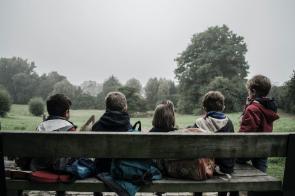Nonreligious childhood: Growing up unbelieving in contemporary britain
Situated in conversation with a small but growing literature on childhood and religion in sociology, anthropology, and religious studies, this project addresses what it means to be unbelieving for children in the UK. This fills an important gap in our understanding of the substantive nature and forms of children’s unbelief, enabling future comparative and theoretical work on children’s nonreligious formation and their cultures of unbelief.
The issue

Quantitative research has drawn attention to the significance of the family, education and geographical variation in contributing to declining religious belief, affiliation and practice, as well as to increasing numbers of children identified as nonreligious. There is however a lack of knowledge about the nature, varieties and substance of children’s unbelief in the UK and other global settings.
Previous research on religion and socialisation has been dominated by North American studies, based on largely white, Christian samples or surveys of teenagers, which have charted the decline of religious identification and belief but have not explored unbelief as an area of inquiry in its own right.
The project
Attentive to children’s agency, the project will deepen understanding of the ways in which children negotiate, construct and reconstruct unbelief and how this is shaped by the actions of adults in relation to them.
The project builds on research focusing on nonreligious young people and on how nonreligious parents are raising their children, their educational choices and their nonreligious identification of their children through providing insight into the cultures of unbelief of children themselves.
Through comparative ethnographic fieldwork with primary schools located in three contrasting geographical microclimates in the UK, the project will examine the experiences, beliefs and values of unbelieving children as they move between everyday spaces of school and home.
Since the majority of those holding significant religious unbeliefs identify as not religious, the study will focus particularly on children identifying as not religious and will address the following research questions:
- What does it mean to be unbelieving for children? What are the material, emotional, embodied, and relational dimensions of their unbelief?
- How, when and where do children learn to be unbelieving? What does this mean for them and for adults in relation to them? How do children negotiate and experience their unbelief as they move across a range of social settings, including school, home, and other social spaces?
- How are children’s unbeliefs interrelated with particular worldviews and existential cultures? What range of beliefs, practices, identities, and moral orientations are held alongside their unbeliefs?
These questions are also relevant to wider public issues, enabling insight into how unbelieving and nonreligious children interact with aspects of religious education or collective aspects of worship in schools and what it might mean for the latter to be continued in the context of growing numbers of nonreligious children.
Is there currently an adequate public language through which such children are helped to recognise and reflect on their existential commitments?
How and to what extent does children’s unbelief provide a moral orientation for their lives?
Research starts: 1 August 2017
Research ends: 28 February 2019
Award: £108,635
People
Principal Investigator: Dr Anna Strhan (Sociology, University of York)
Co-Investigator: Dr Rachael Shillitoe (Sociology, University of York)
Research Outputs
Previous studies examining the rise of non-religion have demonstrated that the transmission of non-religious across generations is taking place, and that this is an important part of the growth of non-religion. Our project provided new data revealing the micro-level processes through which socialization into a non-religious identity or worldview is happening, for example, how family influence relates to the influence of schooling, peers, media, and other social networks in determining children’s non-religious identities, beliefs and practices. While existing research on religious transmission has demonstrated the importance of family context, the multi-sited ethnographic approach we used reveals the important role that is also played by school context and children’s own reflections in shaping their formation as non-religious.
Our project also provides insight into the varieties and meanings of children’s ‘unbelief’, and how this is shaped and negotiated in childhood, and how parents reflected on these issues, and what this means for how we think about godlessness and the life course.
Publications/outputs:
Strhan, A. and Shillitoe, R. (2019). The stickiness of non-religion? Intergenerational transmission and the formation of non-religious identities in childhood. Sociology, 53(6), pp.1094-1110.
Published version: https://journals.sagepub.com/doi/abs/10.1177/0038038519855307
Shillitoe, R. and Strhan, A. (2020). ‘Just leave it blank’non-religious children and their negotiation of prayer in school. Religion, 50(4), pp.615-635.
Published Version: https://www.tandfonline.com/doi/abs/10.1080/0048721X.2020.1758230
https://blogs.lse.ac.uk/religionglobalsociety/2021/03/childhood-and-the-rise-of-non-religion/
Contact details
Dr Anna Strhan
- Tel: +44 (0) 1904 32 3040
- email: anna.strhan@york.ac.uk
